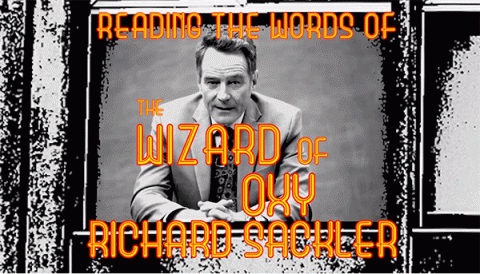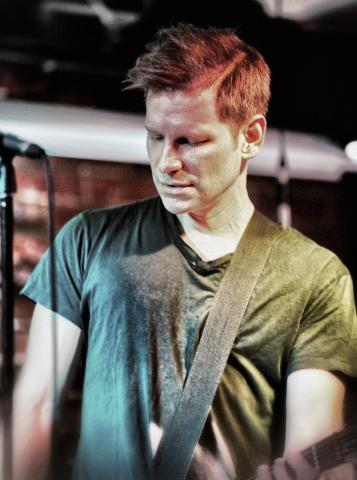
“My goal is to make the name Richard Sackler synonymous with mass death,” says Canadian musician Tom Barlow, who wrote “The Wizard,” with Tom Lewis, using the words of the former head of Purdue Parma, maker of OxyContin, owned by the billionaire Sackler family.
The Juno-nominated pop singer-songwriter, who releases music under Barlow, had read the news reports citing lawsuit documents containing damning messages and memos by Sackler that prove he was aware of the addictive nature of the drug launched in the U.S. in 1996.
In one example to VP of research and development Robert Kaiko, in an effort to sell the drug as a “non-narcotic” in other countries, Kaiko wrote to Sackler, “[O]xycodone containing products are still among the most abused opioids in the US. If OxyContin is uncontrolled... it is highly likely that it will eventually be abused.” Sackler responded, “How substantially would it improve your sales?”
In 2007, Purdue pled guilty to misleading doctors about the risks of OxyContin and was ordered to pay out $600 million U.S. in fines, a drop in the bucket for the billionaire family, which continued to aggressively pursue sales over the next decade.
While 8,048 people died in 1999 from any opioids and continued to rise to 47,600 in 2017, according to figures from the Drug Institute on Drug Abuse, the Sackler family’s wealth continued from Purdue and other holdings. In 2016, Forbes estimated their net worth at at least $14 billion.
In March of this year, the company agreed to pay $270 million U.S. to settle one of many lawsuits and last month announced it would use its bankruptcy settlement “to provide more than $10 billion of value to address the opioid crisis."
While most are simply sick to our stomach over their greed and callousness, Barlow created a song about it, produced and mixed by Bill Bell (Tom Cochrane, Jason Mraz), and directed a music video using clips from TV host John Oliver’s segment, employing actors Michael Keaton and Bryan Cranston.
Samaritanmag talked to Barlow about what moved him to create the song and what he hopes to achieve.
How has the opioid crisis affected you?
I've been to two funerals of people very close to me. One was a 14-year-old boy who'd overdosed on fentanyl. I realized that everyone I talked to had at least a story or two or three about funerals that they've gone to of people who'd overdoses on opiates, whether it was Oxycontin or fentanyl or people who had become addicted to opiates from taking those painkillers, and then moved on to a heroin or whatever version they could they could find. I looked at the numbers and it was 300,000 Americans since ‘95.
I saw a figure that said 400,000.
This is the thing, if you overdose on heroin, but became addicted to opiates through over the counter medications, you're in that group and the exact numbers get really hard to find. Also, you have people who were doing multiple things; they were doing cocaine; they were drinking; and they were doing opiates. The numbers are astronomical. Details of numbers, to me, are less interesting than the fact that this is a massive crisis. There's hundreds of thousands of people dead. There's billions of dollars generated. It makes Pablo Escobar look small time when you look at amount of death that this has caused.
I come from a tradition of protest singers. When there were immoral wars, there were protest songs. That is one of the roles of the artist in society to talk about those things. And, in my opinion, when Neil Young calls out [President Richard] Nixon in “Ohio,” you see a musician taking a stand and naming names. And I felt that in this situation, a crisis this big, I could not not say something,
Purdue has been in the news for a long time for their role in the crisis. When did you start paying attention to it?
Probably three or four years ago. Purdue had been sued 10 years ago and found guilty and paid a fine. Part of them being found guilty was that they were forced to alter the way they make Oxycontin. One of the things they were forced to do was put the tablets in a resin so that they couldn't be crushed as easily, so that they couldn't be snorted as easy or injected. So that did not affect their business model at all. They paid the fine and they kept doing what they were doing and they kept pushing their salesman to sell more. And the opioid crisis just continued to grow.
My concern is that it's in the news, mostly in the business section and it's about a company. It comes across as Purdue Pharmaceuticals will pay a multimillion dollar fine, and that's where it ends. But people I know who are very knowledgeable, and read the news, didn't know who Richard Sackler was, didn't know the things that this company had done to market opioids to people, and generate this multimillion billion dollar industry.
The messages and memos from Richard Sackler are shocking. It’s more than us reading, “Oh, this pharma company's getting sued for X amount of dollars.” They show, similar to the tobacco industry, that they knew it was addictive and wanted it to be.
The tobacco industry is an interesting correlation. We know that for years the tobacco companies fought the science, denied that nicotine was addictive. They would say it's habit-forming, but it's not addictive. And they used all of their corporate power, and all their lobbying power, to try to protect themselves What I find different in this case is that you have this deadly drug — tobacco kills you over the course of a lifetime; opiates can kill you in a second. And you have this company selling this deadly drug. They know it’s a deadly drug and they specifically marketed it as not as addictive as the alternatives. And it was strictly because they said, “We can get a huge market share if we take opiates and say it's not just for end of life; it’s for your knee pain or your back pain, and this is very safe and it has very few side effects. And the side effects are sleepiness, very minor side effects.” That's obviously a lie. And they obviously knew it was a lie and they had no qualms about lying, knowing full well that people were becoming addicted and dying.

The bass player of my band, Tom Lewis, sent me a really cool ‘60s-sounding baseline and I started messing around with some guitar parts and some melodies. That chorus “a little more, a little more” came into my head and I started to build a song.
When you write a protest song, it can't be a speech. If it’s great speech and a terrible song. It's an absolutely fail. So my goal was to try to write a lyric that would not be condescending and not be preachy. And I was having a real hard time doing that ‘cause I was so outraged. I didn't want the outrage to get in the way of writing a good song. What I found allowed me to say what I wanted to say was to just use their words because their words are so outrageous. If I made that up, I think it would sound made up. Their words are such an indictment that I thought I'll just build it off of their words and people can make their judgment based on what those people said.
You created the music video using parts of a bit John Oliver's did on his TV show with Bryan Cranston, Michael Keaton, and other actors, reading from Richard Sackler's messages and deposition. Is there a copyright issue with that?
It's a neat story because I had written a song and then I see John Oliver is doing a piece on Purdue. It was actually the second piece he'd done [2006, 2019]. And what he made clear was the problem with this guy Richard Sackler is he said all these terrible things, but there's no video of him saying these terrible things. So he said, “I’m going to get some great actors to read these lines from Richard Sackler and to act as if he was actually reading them,” so there would be some drama. The words would have impact, instead of just being quotes on a page. On his show, he said, “I'm going to post these to sacklergallery.com,” and then he said, “Use them as you will.” And I went, “Wow, I'm going to be able to use these great actors video clips, reading the words to my song in my music video.”
You had already used the words in your song and he's using the same words for his bit.
Exactly. The quotes are so outrageous that what outraged John Oliver outraged me. So we ended up using the same quotes to point out the nature of this criminal enterprise.
Your goal is what?
My goal is to make the name Richard Sackler synonymous with mass death. The reason is that that person is running around trying to make the Sackler name synonymous with art and institutions of higher learning and putting his name on museums and putting his name on universities. And I think that everyone who's been to a funeral, and lost a loved one, would get some comfort knowing that there was a guy behind this, that it was a carefully orchestrated plan and that we are all the victims of that plan.
Would you like for the institutions — The Met, the Louvre, Museum of Natural History, Guggenheim, Yale, Oxford and others — where the Sackler family has plaques, wings etcetera, to remove their name?
I don't think there's many universities that have the Pablo Escobar wing for obvious reasons. I personally believe that anyone involved in the marketing of opiates that knew they were killing people, that knew they were addicting millions of people, If you knew that was going on and you continued to do it anyway, I believe it's criminal. So my goal is to change the conversation from “Wow, let's get them to pay a big fine to let's have this name associated with what it is, which is a mass murder. And let's make sure that there are criminal charges with some relationship to the amount of tragedy that it has created. And let's take all of the money that was generated from this campaign of lies and give it to victims, victims’ families and programs that would help the addicted get back on their feet, get the rehab help they need. Fourteen billion dollars could go a long way to helping a lot of people.
Is the song available for sale?
The song is not out yet. Just the video on YouTube for people to share. I'm a musician and selling songs is what I do. This is the first time in my career. I'm really not too concerned about that. I want to get the song out; I want to get the message out.
Watch the video below:
Sneakers Nike